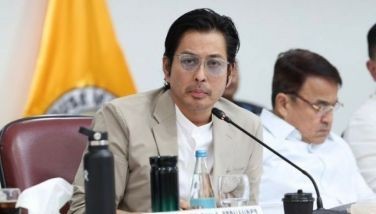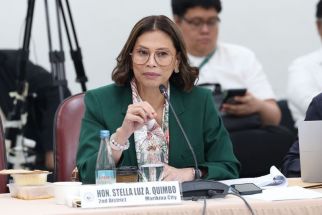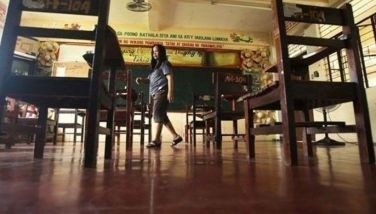A responsibility, not a reprieve

This year is the 20th year of publication of the annual Trafficking in Persons (TIP) Report from the US State Department. The TIP Report has evolved into a foundational policy document for the discussion of human trafficking. For two decades, the report has laid out yearly trends and emerging issues, best practices and progress assessments for States and their programs of action against TIP. In each report, nations are discussed individually and (since 2003) government efforts are broken down and assessed under the “3Ps” paradigm – prosecution, protection and prevention. The nations in the report are then ranked according to four tiers.
For the fifth year in a row, the Philippines has achieved Tier 1 status. This means that we have obtained the highest possible status in compliance with US anti-human trafficking measures.
To understand the magnitude of this achievement, some background is required. Tiers are decided based on the extent of a government’s efforts to meet the minimum requirements for the elimination of human trafficking, as laid out in Trafficking Victims Protection Act of the United States, consistent with international agreements such as the Palermo Protocol. These requirements are:
1) The government of the country should prohibit severe forms of trafficking in persons and punish acts of such trafficking.
2) For the knowing commission of any act of sex trafficking involving force, fraud, coercion or in which the victim of sex trafficking is a child incapable of giving meaningful consent, or of trafficking which includes rape or kidnapping or which causes a death, the government of the country should prescribe punishment commensurate with that for grave crimes, such as forcible sexual assault.
3) For the knowing commission of any act of a severe form of trafficking in persons, the government of the country should prescribe punishment that is sufficiently stringent to deter and that adequately reflects the heinous nature of the offense.
4) The government of the country should make serious and sustained efforts to eliminate severe forms of trafficking in persons.
Tier 3 nations are those that do not meet these minimum standards and, in addition, are not making significant efforts to do so. Tier 2 nations are making significant efforts even if they do not meet these minimum standards. Those that qualify for Tier 2 but have an increasing number of victims or have not shown increased efforts from the past year are placed in the Tier 2 Watch List – a warning that they will be dropped to Tier 3 if they do not quickly improve. And finally, for those nations that manage to be fully compliant with the minimum standards, we have the Tier 1 classification.
Of the 188 nations assigned to Tiers in the 2020 TIP Report, only 34 achieved Tier 1 status. Of these, only Singapore and the Philippines have qualified from the ASEAN, with Singapore achieving that status for the first time this year.
The journey has been long, difficult but worthwhile. Ten years ago, the Philippines was in the Tier 2 Watch List, teetering on the brink. The TIP Report of that year stated that “[h]undreds of victims are trafficked each day in well-known and highly visible business establishments” amongst other signs of an endemic problem, including partnerships between traffickers, syndicates and corrupt law enforcement officers. One of the most damning criticisms at the time was the government “did not show evidence of significant progress in convicting trafficking offenders, particularly those responsible for labor trafficking.” In fact in that year, the government failed to successfully convict anyone of labor trafficking, nor had any cases been filed against officials for trafficking-related corruption.
Slowly but surely, through the sacrifice and effort of many in government and partner NGOs, the Philippines improved. In 2011, prosecutors secured the first-ever labor trafficking convictions, and the country rose to Tier 2. In 2012, the government significantly increased funding of the Inter-Agency Council Against Trafficking (IACAT), and charges were brought against 18 government officials for trafficking-related corruption. In 2013, amendments were made to the anti-trafficking law in order to enable a wider prosecution of cases. In 2014, funding of the IACAT was nearly doubled, and investigations were made into the trafficking of people displaced by Typhoon Yolanda (Haiyan). And in 2016, the year when the government’s training and awareness programs vastly expanded their reach and a shelter for trafficking victims was opened in Saudi Arabia, the Philippines was finally elevated to Tier 1 status.
However, to maintain that status, a State cannot sit on its laurels. Governments need to demonstrate appreciable progress each year in combating trafficking in order to retain Tier 1 status, the bar constantly being raised. That the country has managed to maintain its Tier 1 status for five years is a testament to the efficacy of its initiatives and programs against trafficking, such as the Recovery and Reintegration Program for victim-survivors, the establishment of Anti-Trafficking Task Forces in all regions and air and seaports and greater involvement of local government units. There has also been increased assistance to survivors who provide testimony and the use of prosecution procedures that reduce the potential harm to victims.
Retaining Tier 1 status for five years straight is an incredible achievement for the country, one which should serve as validation for those who have poured their lives into combating human trafficking. Yet an achievement is not the same as a victory – human trafficking is still a major problem in our country, one which has reached into the online world where we and our children increasingly work, learn and play. As long as the vulnerable are still being exploited and preyed upon by criminals, the corrupt and even those they trust the most – the work against trafficking must continue.
As stated in the latest edition of the TIP Report: “Tier 1 represents a responsibility rather than a reprieve.” There is a reason that what is measured is compliance with the minimum standards. It is indeed an honor to achieve Tier 1 status but it also an obligation to ensure that these standards achieve the goal of ending human trafficking. A Tier 1 status indicates that we have done well in acquiring the necessary equipment and systems to fight TIP; but defeating this global menace is another story. The monster of human trafficking remains dangerous and at large in our country. Each year the government, NGOs and the private sector intensify efforts to slay this evil monster because we know that the only way to win against it is to fight as one.
- Latest
- Trending

























